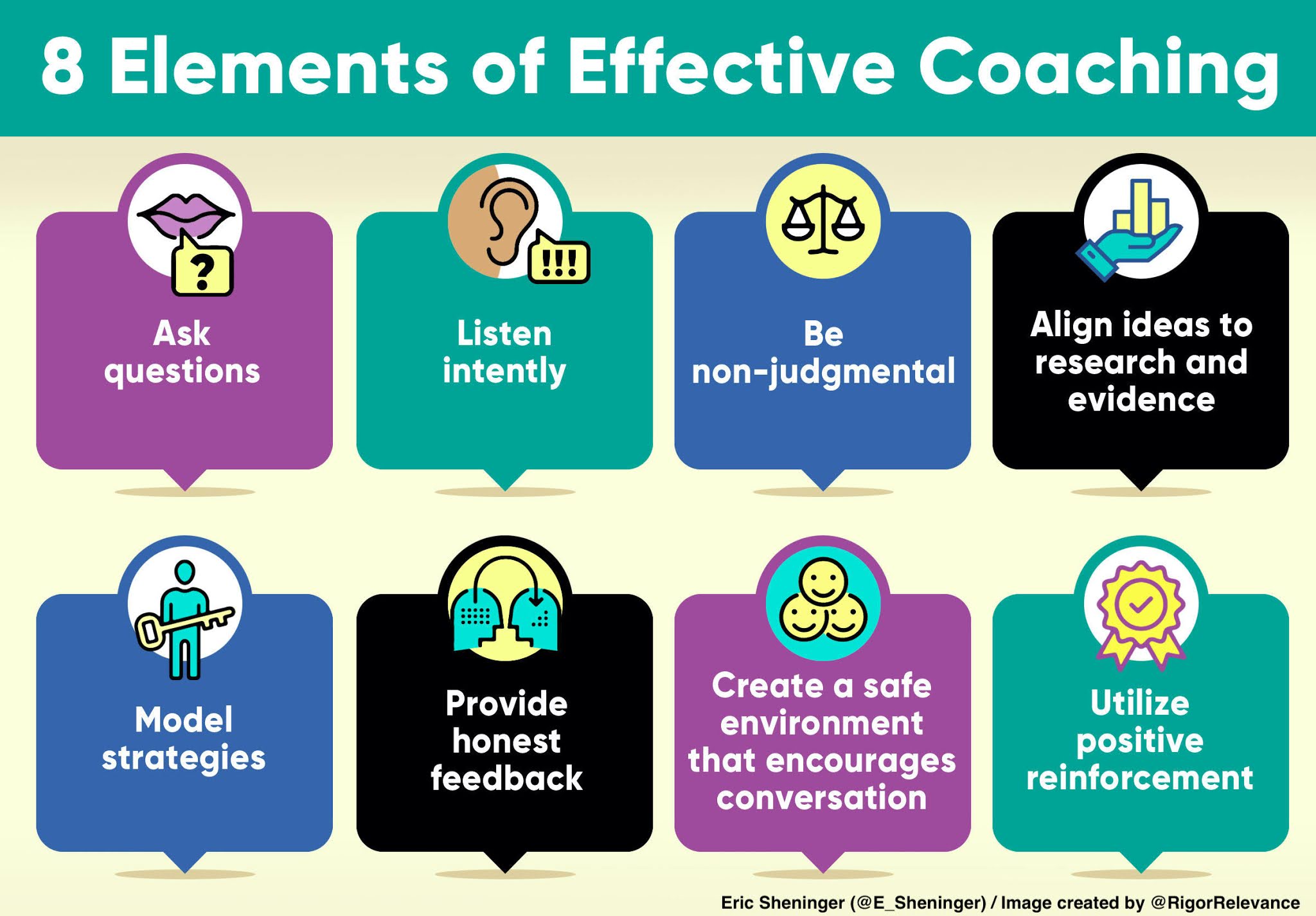Effective coaching strategies involve active listening, clear communication, and providing constructive feedback. These approaches help individuals grow and achieve their goals.
Effective coaching is essential for personal and professional development. Active listening allows coaches to understand their coachees’ needs and challenges. Clear communication ensures that instructions and expectations are comprehensible. Providing constructive feedback helps individuals recognize areas for improvement and encourages continuous growth.
Setting realistic goals and creating action plans also play a crucial role in the coaching process. By building a supportive and trusting relationship, coaches can motivate and inspire their coachees. Implementing these strategies leads to improved performance, higher satisfaction, and sustained success.
Introduction To Coaching Strategies
Effective coaching strategies help individuals and teams achieve their goals. These strategies build skills, improve performance, and foster personal growth. Understanding the core elements of coaching is crucial for success.
Importance Of Coaching
Coaching plays a vital role in personal and professional development. It provides guidance, support, and accountability. The importance of coaching can be seen in various areas:
- Skill Development: Coaches help individuals develop new skills and improve existing ones.
- Performance Enhancement: Coaching improves performance in specific tasks or roles.
- Goal Achievement: Coaches assist in setting and reaching personal or professional goals.
- Confidence Building: Effective coaching boosts confidence and self-esteem.
Goals Of Effective Coaching
Effective coaching aims to achieve several key goals:
- Clarify Objectives: Help individuals define clear, achievable goals.
- Develop Action Plans: Create step-by-step plans to reach these goals.
- Provide Feedback: Offer constructive feedback to guide improvement.
- Encourage Accountability: Hold individuals accountable for their progress.
- Foster Growth: Support continuous learning and development.
By focusing on these goals, coaches can effectively guide individuals to success.
Building Trust With Coachees
Effective coaching begins with building trust between the coach and the coachee. Trust forms the foundation of successful coaching relationships. Without trust, coachees may feel uncomfortable and less open. This can hinder their growth and development. Let’s explore some key strategies to build this trust.
Establishing Rapport
Establishing rapport is the first step in building trust. Start by showing genuine interest in the coachee’s life and goals. Ask open-ended questions to learn more about them. Use positive body language such as nodding and smiling. This helps create a warm and welcoming environment.
- Maintain eye contact.
- Offer a friendly greeting.
- Show empathy and understanding.
Active Listening Techniques
Active listening is crucial for trust-building. It shows that you value the coachee’s thoughts and feelings. Practice the following techniques to improve your active listening skills.
- Paraphrasing: Repeat back what the coachee says in your own words.
- Clarifying: Ask questions to ensure you understand their point.
- Reflecting: Mirror their emotions to show empathy.
Use these techniques to enhance communication. This can lead to a deeper connection with your coachee. Remember, the goal is to create a safe space. This allows the coachee to express themselves freely.
| Technique | Description |
|---|---|
| Paraphrasing | Repeat back in your own words. |
| Clarifying | Ask questions to ensure understanding. |
| Reflecting | Mirror emotions to show empathy. |
By applying these strategies, coaches can build a strong foundation of trust. This trust is essential for effective coaching and achieving desired outcomes.
Setting Clear Objectives
Effective coaching requires setting clear objectives. Goals give direction and purpose. They help both coach and coachee stay focused. Clear objectives also measure progress and success.
Defining Success
First, define what success looks like. This step is crucial. It provides a target to aim for. Without a clear definition, efforts can scatter.
Ask yourself and the coachee:
- What specific outcomes do we want?
- What skills need improvement?
- What timeline is realistic?
These questions help clarify the vision. They also make the goals tangible and achievable.
Creating Action Plans
Next, create a detailed action plan. This plan outlines steps to reach the goals. It breaks down tasks into manageable parts.
Here’s an example:
| Task | Responsible Person | Deadline |
|---|---|---|
| Identify skill gaps | Coach | Week 1 |
| Develop training modules | Coach | Week 2 |
| Complete first training session | Coachee | Week 3 |
Breaking tasks into smaller steps makes them less daunting. It also helps track progress. The coachee can see their achievements and stay motivated.
Remember to review and adjust the plan regularly. Flexibility is key to effective coaching.
Adapting Coaching Styles
Effective coaching requires flexibility. Adapting coaching styles to suit individual needs is crucial. Different people respond to different methods. This section explores how to tailor your coaching techniques.
Understanding Different Styles
Coaches use various styles to guide people. These include:
- Directive Coaching: The coach gives clear instructions. This style suits beginners or those needing firm guidance.
- Non-Directive Coaching: The coach asks questions. This helps the person find their own answers. It’s great for experienced individuals.
- Democratic Coaching: The coach and person work together. Decisions are made jointly. This style encourages participation and ownership.
- Holistic Coaching: The coach considers the whole person. This includes their emotions, thoughts, and physical state. It’s ideal for personal development.
Choosing The Right Approach
Choosing the right approach depends on several factors. These include:
| Factor | Details |
|---|---|
| Experience Level | Beginners may need more direction. Experienced individuals might prefer a non-directive style. |
| Personality | Some people respond well to firm guidance. Others thrive with more freedom. |
| Goals | Clear, short-term goals might need a directive style. Long-term, personal growth goals might benefit from a holistic approach. |
Effective coaches adapt their styles. They consider the person’s needs and goals. This makes the coaching process more impactful.
Providing Constructive Feedback
Giving feedback is crucial for effective coaching. It helps individuals grow and improve their skills. Constructive feedback is both positive and practical. It provides clear guidance on areas that need improvement.
Effective Feedback Methods
There are many ways to give feedback. Here are a few effective methods:
- Be Specific: Focus on particular actions or behaviors.
- Be Timely: Provide feedback soon after the event.
- Be Balanced: Mix positive feedback with areas for improvement.
Specific feedback is more actionable. Instead of saying “Good job,” say “Your presentation was clear and engaging.” This gives the person clear insight into what they did well.
Encouraging Growth
Feedback should encourage growth. It must highlight both strengths and areas needing improvement. Positive feedback boosts confidence. Constructive criticism points out areas to work on.
Here are steps to encourage growth:
- Identify Strengths: Acknowledge what the person does well.
- Highlight Areas for Improvement: Clearly point out what needs change.
- Set Goals: Help set achievable, realistic goals.
Encouraging growth involves a mix of praise and constructive advice. This balanced approach builds confidence while fostering improvement.
| Aspect | Action |
|---|---|
| Strengths | Highlight what is done well. |
| Improvements | Point out areas needing change. |
| Goals | Set achievable targets. |
Remember, the goal of feedback is to foster growth. Always be supportive and encouraging.
Motivating And Inspiring
Effective coaching requires not just instructing but also motivating and inspiring your team. The right strategies can empower individuals to achieve their best. This section explores techniques to inspire and maintain motivation.
Techniques To Inspire
Great coaches use various methods to inspire their teams. Here are a few effective techniques:
- Lead by Example: Show your team how it’s done. Display the behaviors you want to see.
- Share Success Stories: Highlight past successes. Use these stories to show what’s possible.
- Set Clear Goals: Define clear, achievable goals. Make sure everyone understands the objectives.
- Provide Constructive Feedback: Give feedback that helps team members grow. Focus on improvement.
Maintaining Motivation
Keeping motivation high is crucial for sustained success. Here are some strategies to maintain motivation:
- Celebrate Small Wins: Acknowledge and celebrate even small achievements. This boosts morale.
- Encourage Continuous Learning: Promote a culture of learning. Offer training and development opportunities.
- Foster a Positive Environment: Create a supportive and positive team atmosphere. Encourage collaboration.
- Reward and Recognize: Recognize hard work and dedication. Offer rewards to motivate further.
Incorporating these strategies can help you build a motivated and inspired team. Remember, effective coaching is about more than just giving instructions. It’s about leading, inspiring, and empowering your team to reach their full potential.
Measuring Progress
Effective coaching requires constant monitoring of progress. By measuring progress, coaches can ensure that their strategies are working. This process involves tracking performance and adjusting strategies as needed.
Tracking Performance
Tracking performance is crucial in coaching. Coaches need to record players’ achievements and challenges. They can use various methods to do this:
- Performance charts
- Weekly reports
- Feedback sessions
Performance charts help visualize progress over time. Weekly reports provide detailed insights into each player’s journey. Feedback sessions allow for direct communication and immediate adjustments.
| Method | Purpose |
|---|---|
| Performance charts | Visualize progress |
| Weekly reports | Detail achievements and challenges |
| Feedback sessions | Direct communication and adjustments |
Adjusting Strategies
Adjusting strategies is essential for effective coaching. Coaches must adapt their methods based on performance data. Here are a few ways to adjust strategies:
- Identify areas of improvement
- Set new goals
- Modify training plans
Identify areas of improvement by reviewing performance data. Set new goals to challenge players further. Modify training plans to better align with players’ needs.
Using these methods, coaches can ensure their strategies remain effective. By constantly measuring progress, players can reach their full potential.

Credit: sparrks.io
Overcoming Challenges
Effective coaching strategies often involve overcoming various challenges. Coaches must navigate these obstacles to guide their clients successfully. This section will discuss key tactics for handling resistance and dealing with setbacks.
Handling Resistance
Resistance can arise from fear or uncertainty. To handle resistance:
- Listen actively: Understand the root cause of resistance.
- Empathize: Show that you understand their concerns.
- Set small goals: Break down large tasks into smaller, manageable steps.
- Provide support: Offer resources and encouragement.
By addressing these points, coaches can turn resistance into cooperation.
Dealing With Setbacks
Setbacks are inevitable in any coaching journey. To manage setbacks effectively:
- Stay positive: Maintain an optimistic outlook.
- Analyze the setback: Understand what caused the problem.
- Adjust the plan: Modify goals and strategies as needed.
- Celebrate small wins: Recognize progress, even if it’s minor.
These steps help to keep the momentum going and build resilience.
Utilizing Tools And Resources
Effective coaching requires the right tools and resources. These can enhance the coaching process. Using digital tools and various resources can streamline tasks. They can also make sessions more productive and engaging.
Digital Coaching Tools
Digital tools play a significant role in modern coaching. They help track progress, set goals, and communicate efficiently. Here are some of the best digital coaching tools:
- Coaching Management Software: Platforms like CoachAccountable and CoachLogix help organize sessions.
- Video Conferencing Tools: Zoom and Microsoft Teams enable face-to-face virtual meetings.
- Project Management Tools: Trello and Asana keep track of tasks and deadlines.
- Goal Tracking Apps: Apps like Strides and GoalsOnTrack help set and monitor objectives.
Resource Recommendations
Books, articles, and online courses can supplement coaching methods. Here are some recommended resources:
| Type | Recommendation |
|---|---|
| Books | “The Coaching Habit” by Michael Bungay Stanier |
| Articles | “Effective Coaching Strategies” on Forbes.com |
| Online Courses | Coursera’s “Coaching Skills for Managers” |
These resources provide valuable insights and techniques. They can enhance your coaching skills and knowledge.
.png)
Credit: www.classcardapp.com
Conclusion And Next Steps
Effective coaching is key to developing strong teams and individuals. The journey does not end with the implementation of strategies. It is essential to recap, reflect, and plan the next steps for continued success.
Recap Of Strategies
Let’s briefly revisit the effective coaching strategies discussed:
- Active Listening: Engage fully with your coachee’s words and emotions.
- Goal Setting: Establish clear, achievable goals for progress.
- Feedback: Provide constructive, actionable feedback regularly.
- Encouragement: Motivate and inspire through positive reinforcement.
- Skill Development: Focus on improving specific skills through practice.
These strategies create a supportive and productive coaching environment. Consistency in application ensures long-term benefits.
Future Coaching Plans
To maintain momentum, create a plan for future coaching activities:
- Schedule Regular Check-ins: Set up regular meetings to track progress.
- Identify New Goals: Continually update goals as progress is made.
- Ongoing Training: Invest in continuous learning opportunities for coaches and coachees.
- Monitor and Adjust: Regularly review and adjust strategies for effectiveness.
- Celebrate Successes: Acknowledge and celebrate milestones and achievements.
Implementing these steps ensures sustained growth and improvement. It fosters a culture of continuous development and success.
| Strategy | Action | Frequency |
|---|---|---|
| Active Listening | Engage in conversations | Always |
| Goal Setting | Set clear targets | Monthly |
| Feedback | Provide actionable feedback | Weekly |
| Encouragement | Motivate and inspire | Daily |
| Skill Development | Focus on practice | Bi-weekly |

Credit: esheninger.blogspot.com
Frequently Asked Questions
What Are Effective Coaching Strategies?
Effective coaching strategies involve active listening, goal setting, and providing constructive feedback. Coaches should also encourage self-reflection.
How Can Coaches Improve Communication Skills?
Coaches can improve communication by practicing active listening, asking open-ended questions, and providing clear, concise instructions.
Why Is Goal Setting Important In Coaching?
Goal setting is important because it provides direction and motivation. It helps track progress and achieve desired outcomes.
How Does Active Listening Benefit Coaching?
Active listening builds trust, fosters understanding, and ensures that the coach accurately comprehends the coachee’s needs and concerns.
Conclusion
Effective coaching strategies can transform individuals and teams, leading to remarkable growth and success. Implementing clear communication, setting achievable goals, and providing consistent feedback are crucial. By fostering a positive environment and encouraging continuous improvement, coaches can unlock their team’s full potential.
Start applying these strategies today and witness the transformative impact.




